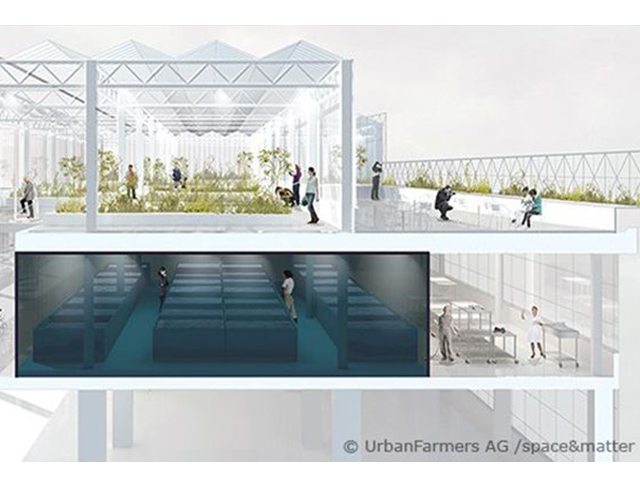ROOFTOP GREENHOUSE TO GRACE THE HAGUE
04 May 2016
A disused office in The Hague has been revamped as a sprawling rooftop greenhouse, with a fish farm operating on the floor below.

Are we entering a new age of urban agriculture?

At the top of an empty 1950s office block that once belonged to the Dutch telecommunications powerhouse Philips, above an abandoned reception desk and six floors of vacant office space, is a shock of green. Here, on a concrete building in The Hague, is a modern experiment: Europe’s largest urban farm.
Tomatoes, vegetables and trendy “microgreens” are sprouting in a sprawling 1200 sqm rooftop greenhouse. Below, on the fishy-smelling sixth floor, is a huge fish farm.
The rather post-apocalyptically named UF002 De Schilde launches next month (the UF refers to UrbanFarmers, the company behind the farm). The eventual hope is to serve 900 local families, plus restaurants and a cooking school, with 500 tilapia a week and 50 tonnes of rooftop veg a year.
Mark Durno, the 31-year-old Scot in charge of the operation, believes commercial urban farms serve a need: people want high-quality food from a transparent, local source. “In the next five or even 15 years, this will be a niche of the niche,” admits Durno. “But it links into the circular economy: we have empty rooftops and empty industrial buildings. In The Hague, 15% of buildings are empty. Let’s fill them with produce.”
There is some serious interest in rooftop farms as the future of commercial urban agriculture. In the US, advocates such as the Columbia University professor Dickson Despommier call it a way of “feeding the world in the 21st century”. There are urban farms in Berlin and London, where former air-raid shelters grow food to supply markets and a home delivery service. The New York City project Five Borough Farm promotes urban agriculture, and the city is home to an estimated 900 urban farms and gardens on 50 acres.
Modern technology has helped make urban farming a viable prospect. At UrbanFarmers, the shimmery tilapia swim in 28 tanks. Baby fish, farmed in nearby Eindhoven, come in on one side, fed by an automated system; across the room are tanks for the bigger fish, which will be killed by electrical stunning. In another vat of water, bacteria convert waste ammonia from fish excrement into nitrates to fertilise the plants on the roof above. Meanwhile, the plants – which are grown without soil – purify the fish water. This closed system, known as aquaponics, has been used for centuries.
“With industrialisation, that connection between agriculture and the city was taken away,” says Jan Willem van der Schans, a researcher in urban food systems at the Landbouw Economisch Instituut (LEI). “Food can be grown anywhere and sent anywhere else. UrbanFarmers is an example of cities reconnecting with food. Consumers feel alienated from global food chains, want food from a transparent source, and they see that quality can be better if it grows close to home.”
Joris Wijsmuller, head of sustainability at The Hague city council, is a fan. In 2013, the council launched a competition for sustainable food companies to find new uses for the former Philips building. UrbanFarmers BV was the winner, getting free council support and a chance to rent the space, once it had raised private funding and a European loan via The Hague’s Fund for Location and Economy (FRED).
“It’s sometimes said that children who live in the city believe tomatoes grow in the supermarket or fish are born in the freezer,” Wijsmuller says. “The municipality hopes the whole building will be a sort of gathering place for education, research and innovation.”
It remains an open question however whether urban farming is something more than a temporary fad.
Jan-Eelco Jansma, a researcher in urban-rural relations at Wageningen University, believes the urban farming movement has legs: “There are examples of viable commercial urban farms, but also growth in allotment gardens in the Netherlands and across Europe – which are not interested in being commercial but have a huge, indirect effect on mental health and liveability in cities,” he says.
The Hague outlet will open for business in June, and its new American operation, UrbanFarmers USA, hopes the first of 10 farms could open in 2017.
Via The Guardian

MORE NEWS

DISCOVER THE FUTURE OF INDOOR GARDENING WITH ATLANTIS GRO-WALL® VERTICAL GARDENS

PARISIAN CONCRETE JUNGLE

TORONTO’S QUAYSIDE WATERFRONT SUSTAINABLE COMMUNITY

REVOLUTIONISE YOUR ROOFTOP WITH ATLANTIS® GREEN ROOF SYSTEM

FACELIFT TO FAçADE WITH SUSTAINABLE GREEN WALL

